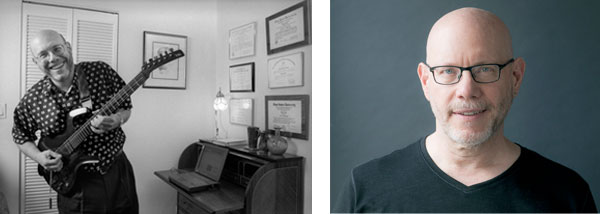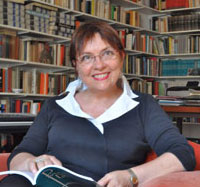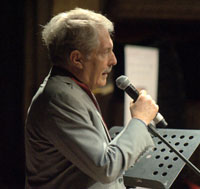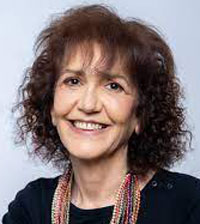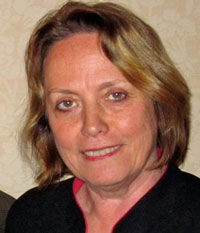Lewis Aron (December 21, 1952 — February 28, 2019)
This month marks five years since the death of one of IARPP’s founding fathers and a seminal theoretician and teacher of Relational psychoanalysis, Lewis Aron.
To help us measure Lew’s lasting legacy and reflect upon the enormity of his loss, still strongly felt by so many, I’ve asked several IARPP members who worked closely with Lew throughout his career to share some thoughts from the vantage point of the nearly five years since his passing.
Galit Atlas (USA)
The night before Lew died, he asked me to leave the room for ten minutes. “I need to climb Bear Mountain by myself,” he said. That night I dreamt about him: He was healthy and strong, and he came to say goodbye. The next morning, he passed away.
It is truly hard to believe that it has been five years since Lew died.
In the introduction to When Minds Meet: The Work of Lewis Aron, I described Lew as someone who constantly dialogued with the dead. Sitting in his office with students, he often said that he could picture Freud among them along with Ferenczi, Klein, Winnicott and Bion. He could imagine what each of their arguments would be, who would debate with whom. Lew would joke that it doesn’t matter which of those figures were dead and which were alive, because we tend to argue mostly with those who are not with us.
Lew left us – the people who loved him, and the psychoanalytic field – with a huge void. He went to climb new mountains, and we remain to converse with him in his absence.
My dramatic dialogue with Lew never dies. He accompanies me in the journey of choosing life; I hear his voice whisper in my ear, I argue with him, I consult with him, and I hold both our love, as well as the horror of his illness and death which we lived through together.
I know that many people in this community – his students, colleagues and friends – have their own version of an immortal dialogue with Lew, missing his warmth, wisdom and leadership now more than ever.
Gianni Nebbiosi & Susanna Federici (Italy) with the whole ISIPSÉ Community in Italy
On behalf of ISIPSÉ, the Institute for Self Psychology and Relational Psychoanalysis (Italy), we want to remember with gratitude and joy the numerous occasions in which we had the opportunity to share ideas and professional experiences with Lew and his human and professional generosity. We met Lew in 1997, and for 22 years he was a strong and gentle point of reference both professionally and humanly for all of us. We will remember in particular his last trip here in Rome, in November 2018: Lew was in great pain but his talks about Searles and about enactments were outstanding. He told us how important his moments of teaching were for him even in those difficult months!
After five years, we are still dealing with his absence within the psychoanalytic dialogue, both in Italy and in the world, but his fundamental book, A Meeting of Minds: Mutuality in Psychoanalysis, is one of the basic books we keep at the core of our training program. In these recent years it has emerged even more clearly that Lew’s contributions were theoretically sophisticated and clinically farsighted. Many themes that he had begun to elaborate are now at the center of psychoanalytic debate and literature. We still miss him very, very much, both as a dear friend and as an incredible teacher. He left a deep “void” in our community and in our hearts and minds.
Spyros Orfanos (USA)
For decades, Lew Aron poured his love into teaching, writing and organizing psychoanalysts. I recall rapturous conversations with Lew about the birth and growth of IARPP. Such talks began in the living room of Steve Mitchell in the year 2000. We were all so young, free, and innocent then.
I read a lot, but let me tell you – Lew read everything, and all the time. And if he wasn’t reading, he was practicing his electric guitar in the office. When he logged onto his state-of-the-art Mac computer the first thing that appeared on the screen was an image of a strumming Eric Clapton.
Lew was a deeply loving man who did not forget those who left us. I recall so clearly his telling me how much he missed Steve Mitchell, Mannie Ghent, Ruth Stein, Muriel Dimen, Jeremy Safran, and many others. How much he loved hanging out with them, thinking, planning, and implementing. And now we are the ones to miss him.
Lew was in possession of a passionate ability to love, and a preternatural brilliance and energy. He was an independent thinker and a man with sparkling authenticity. His legacy is as huge as the sun. Relationships were everything to Lew. He knew how to cry and how to laugh and how to love others.
Few people love with such passion.
Lew was a beautiful man, and these last, freakish five years have not dimmed his beauty.
Amira Simha-Alpern (USA)
I never had a personal friendship with Lew, I was “only” a member of his reading group for over 15 years, but you couldn’t be around Lew without being touched by his warmth and humanity, and without feeling like he cared about you and recognized who you are. When you worked with Lew for so long, you became familiar with his kids, his partners, his dogs, and his books. He had a way of making you feel personally endorsed and supported. Lew inspired me in many ways as a clinician, writer, and educator, and he is a role model for me in any leadership position I serve.
I was in the Atacama Desert in Chile when I received the news of Lew’s death on the morning of Thursday, February 28, 2019. Sunsets in the Atacama Desert are dramatic, and the sunset I watched later that day is still etched in my memory. I recall thinking that this is the last sunset of Lew’s legendary days on this earth. Like most of us close to Lew, I was aware of his declining health, but I was still not prepared for this final goodbye. I felt that the psychoanalytic community had lost its shepherd, and I was afraid that without his leadership we will fall apart into disagreeing fragments. Lew led the international psychoanalytic community through rough waters in a brilliant and sensitive manner. He pulled opposites together to dialogue, meaningfully bridged over disagreements, and had a way of respectfully disagreeing with perspectives he opposed without creating enemies. Once he shared with us a paper he agreed to publish in Dialogues by a colleague who challenged the relational perspective. I was surprised and asked why he decided to do it. “If there is a controversy out there,” he replied, “I want it in my backyard.” His reply still inspires me today when I face pushbacks in my own leadership role.
Although he was a giant in our field, he was still personal and accessible. Success never corrupted him. He replied to e-mails within a few hours if not less, as if your e-mail is the most important one he received that day. I have deep gratitude for his mentorship and availability to guide and assist me when I became the director of the Adelphi Postgraduate Programs. He was always a phone call/e-mail away (weekends and vacations included) and always offered wise and well-balanced advice.
I always enter “Lew Aron” as my favorite teacher when this security question is posed when setting up an online account. Lew was the best teacher and mentor I ever had. He was able to explain complex ideas like no other. There was not even one single reading meeting that I was bored or didn’t learn something new. We joked that as a man who had been groomed to be a rabbi, he read every text like it was the Talmud – going over each line together, deciphering each idea and term. I have him in my mind whenever I teach, and I find myself imitating his style of teaching.
Beyond my professional respect for Lew, I simply loved him. He was not a perfect man – he would have told you that himself – but it was so easy to love him with his human flaws because he owned them, made fun of himself unapologetically, and was simply human.
Lew left this world the same way he lived in it. He knew that his death was near. He taught almost until the last weeks of his life. On February 7, as he was entering hospice, he was feeble, scared, and defeated but still took the time to write our group a meaningful goodbye note. I don’t think he would mind that I share with you just the way he signed off:
Teaching psychoanalysis has been my sustaining love. I wish you all for life to bring you good things.
Love,
Lew
Adrienne Harris (USA)
In the many, variable moments and experiences when I felt particularly proud of and engaged in being part of the relational psychoanalytic community, whether times of pleasure and growth or moments of crisis and uncertainty, Lewis Aron was one of the persons with whom I would want to be talking and understanding. I think of him now particularly within the context of life as a psychoanalyst, as a part of the NYU Postdoctoral community, and quite simply as a citizen in a terrible time of uncertainty and confusion.
Lew’s mind, his heart, his moral compass have always been so deeply important to many of us, in our institutional and analytic communities. I like to think of how to model myself along the lines of his courage and sense of direction. When I think of all that he has missed these past five years, so much work and evolution in the understanding of Ferenczi and others in our relational psychoanalytic ancestry, I feel the sadness of what he and we have missed due to his much-too-early death. I always wanted to know what he was thinking about and how he saw all the changes and evolutions our developmental and relational psychoanalytic world was going through.
At this time, now five years after Lew’s death, I want to honor him, his great mind, deep heart, and his powerful discipline as an analyst, writer, and teacher. I send deep and abiding condolences to his family, friends, colleagues, analysands, and students.
Blessings to all,
Adrienne Harris

